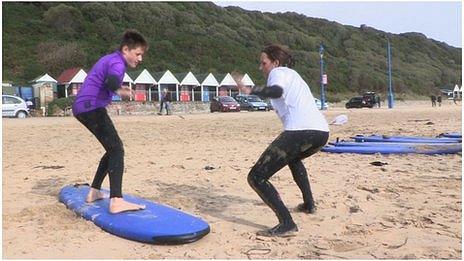NHS-funded surf therapy to boost wellbeing
- Published
Brandon now feels more confident both in and out of the water
Learning to catch your first wave could help conquer depression and low self-esteem, according to a project launched by the NHS in Dorset.
The £10,000 pilot scheme, funded by Dorset Healthcare University Foundation Trust, offers young people a series of surf lessons on prescription.
The fledgling surfers arrive at the seashore facing a range of challenges - from coping with the death of loved ones to dealing with autism or anxiety disorders.
Brandon is 14 and has been referred by social services to help him settle into a home in foster care and a new class at school.
He has had five sessions so far, learning to become familiar with his board, and how to paddle, pop-up and ride the waves.
Each young person has a volunteer mentor who provides one-to-one support both in and out of the water.
Brendon says his experiences at sea have made him more confident.
"Now I am more happy to make friends and I am not shy to let myself out there in the middle of the group instead of just standing back there in the shadows," he says.
'Strong link'
The surf therapy is run by the Wave Project and is open to people aged between eight and 21 who have been referred by mental health, school or social services or bereavement charities.
Joe Taylor, who runs the not-for-profit scheme, says: "What is great is it doesn't feel like therapy for the young people but there are therapeutic principles behind it such as reducing anxiety, promoting confidence and well-being.
"It's the sense they have gone into a challenge that they did not necessarily believe they could do, discovered they could do it and that people were supporting them, making them feel more able to do all sorts of different things in their lives."
And Melissa Scott, team leader of Bournemouth and Christchurch child and adolescent mental health services, says this scheme builds on the very strong link between mental and emotional wellbeing and physical activity.
The Wave Project has run similar sessions on the Cornwall and Devon coasts for the past few years, part funded by the Cornwall and Isles of Scilly Primary Care Trust and with support from charities such as the Big Lottery Fund and BBC Children in Need.
And two local doctors, Laura Bond and Sarah Colpus, who volunteer there, recently presented research on the project at the British Association of Sports and Exercise Medicine Conference.

Volunteers on the project range from sixth-formers to mental health workers
They looked at more than 100 questionnaires filled in by young people before and after the surfing course.
'New challenges'
Taking into account feedback from parents and carers, they found the majority felt their confidence, self-esteem and wellbeing had improved after the course. And parents and people who referred the children said they seemed more engaged in school and had improved behaviour.
Dr Bond said: "Having volunteered with the Wave Project this year, we have seen first hand the really positive impact that the project has on young people who are referred to it.
"But now we have evidence to support the incredible feedback we have seen from clients and parents, so we hope that surfing will be taken more seriously as an intervention by medical professionals."
Dr Jenny Lloyd, of the Exeter University Medical School, who researches child health and wellbeing, said: "In terms of building children's confidence and self-esteem, this is a fantastic initiative. But we cannot say it has greater benefits or is more cost-effective than an activity other than surfing.
"This sort of research is not able to tell us that. If at the core it is group work, or learning new skills that are behind the improvements in wellbeing, there may be other activities which also fit the bill."
But Brandon says is glad he had this opportunity
He says: "Starting new challenges like this helps me look forward to other challenges. I feel more focused and I'm not afraid to do something different.
"And I think after these few sessions I might just buy my own board and just get out there."